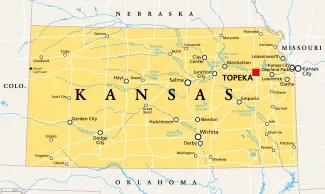
Child welfare advocates split with law enforcement on distinguishing neglect from poverty in Kansas
Testimony over a proposal to redefine “neglect” for the child welfare system showed a divide between social workers and law enforcement.
Legislation in the House seeks to prevent the removal of children from homes based solely on poverty, an issue that child welfare advocates in Kansas have long said the state confuses with neglect.
“Changing the definition of neglect will change the direction of child welfare in our state,” said Representative Cyndi Howerton, a Wichita Republican who chairs the Child Welfare and Foster Care Committee, at a Wednesday hearing. “I am curious why we are divided. That may be a systemic issue that we need to look more into.”

© PeterHermesFurian - iStock-1352430281
House Bill 2132 would change the word “failure” to “refusal” in state policies related to neglect. The word change aims to evaluate families’ care when they are financially available or offered the needed resources.
The bill would prohibit the removal of a child based solely on isolation, a parent’s age, crowded housing, substance abuse, parental drug exposure, mental health, disabilities, special needs or truancy
“Abuse can occur in every socio-economic status, but unfortunately nationally 85 percent of families investigated by children and family services live 200 percent below the poverty line,” said Gail Cozadd of the Kansas Children’s Service League.
Brenna Visocsky of Kansas Appleseed said that of the 6,000 kids in foster care in Kansas, which is twice the national average based on population, more than half of them are attributed to neglect.
“What seems like a minor language change can keep hundreds of families in Kansas together, and increase their opportunities to thrive,” Visocsky said.
Kristalle Hedrick, CEO of the Children’s Alliance of Kansas, spoke in support of the bill, citing the 655 cases of child removals primarily because of neglect or truancy in the last fiscal year in Kansas. Hedrick said poverty is often a root cause of a child missing school, as parents without access to transportation or child care face challenges in getting their children to school.
However, Hedrick said that the alliance was divided on whether to support the bill.

© iStock - SanneBerg
Opponents to the bill said they agreed that poverty should not be a factor in removing children from a home, and noted the harm of placing a child in foster care. But they raised concerns about the possibility of leaving children in dangerous living conditions.
Ed Klumpp, a former Topeka police chief who lobbies for law enforcement groups, said it was problematic that the bill also would strike “the likelihood of harm” as a reason to remove a child. Klumpp said the change would require police to wait until a child has been harmed before intervening.
Mark Jordan, a Sedgwick County prosecutor who handles cases where children need care, said he had “grave concerns” with the proposed bill.
“If the only way we’re accomplishing having less kids in foster care is by putting more children at risk, then we are not helping children,” Jordan said. “We’re making the situation worse.”
Tabitha Owen, Smith County attorney, worried about leaving children in harm’s way with the proposed restrictions.
“This bill really strips us of our ability to protect those at-risk children, and it doesn’t add any services to them,” Owen said. “The services that those families need are intense. They need mental health treatment. They need drug and alcohol treatment. They need social work in the home, if you want to keep children in the home safely. And those don’t exist in rural Kansas, not practically speaking.”
The number of children entering foster care because of parental drug abuse has more than doubled since 2000, according to research published in JAMA Pediatrics.
Morgan Hall, a deputy district attorney in Shawnee County, said metropolitan areas face monthslong wait times for some services.
The committee on February 12 plans to consider amendments and decide whether to advance the bill to the full chamber.
Kansas Reflector is part of States Newsroom, a nonprofit news network supported by grants and a coalition of donors as a 501c(3) public charity. Kansas Reflector maintains editorial independence. Contact Editor Sherman Smith for questions: info@kansasreflector.com.

















